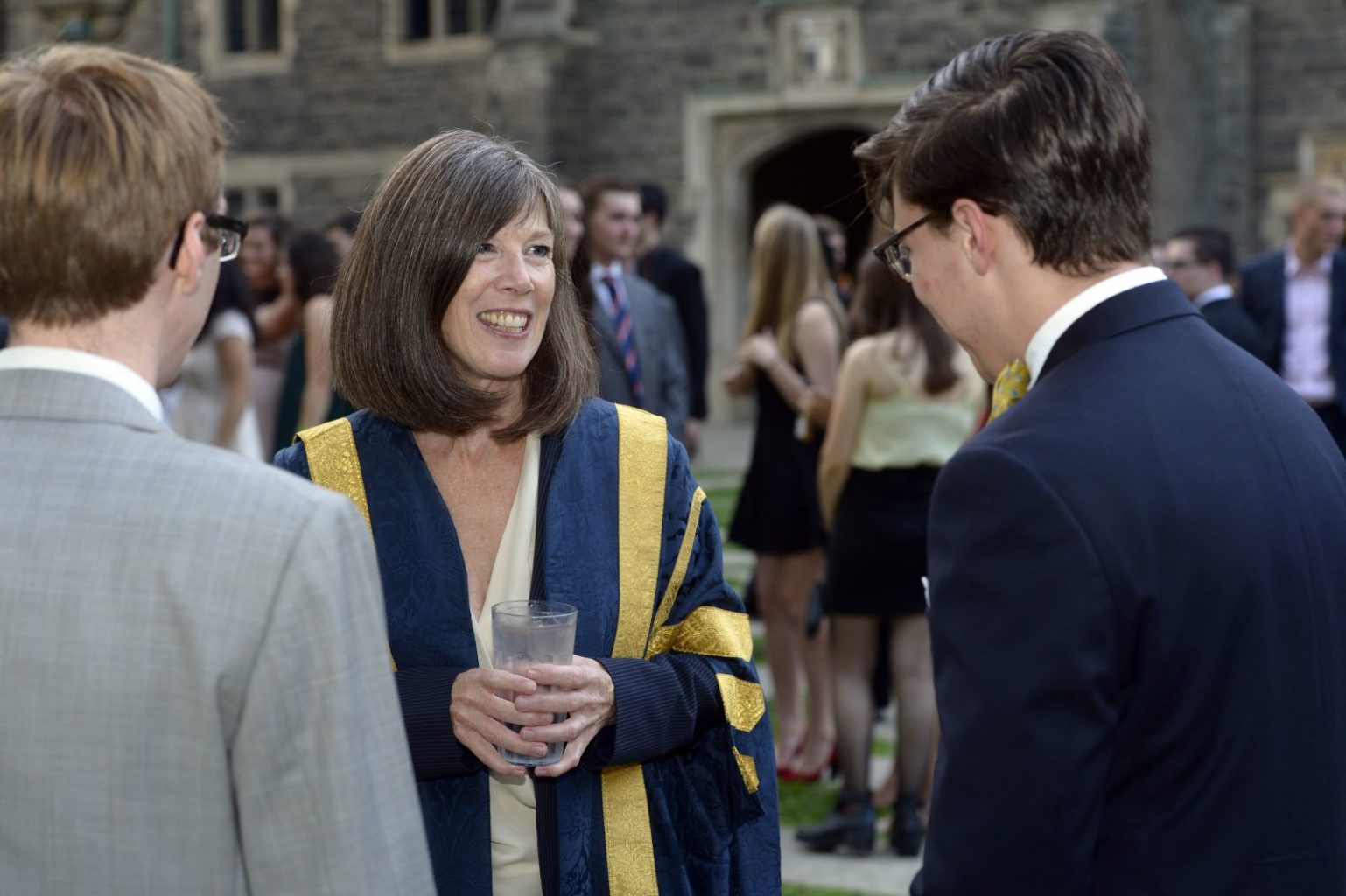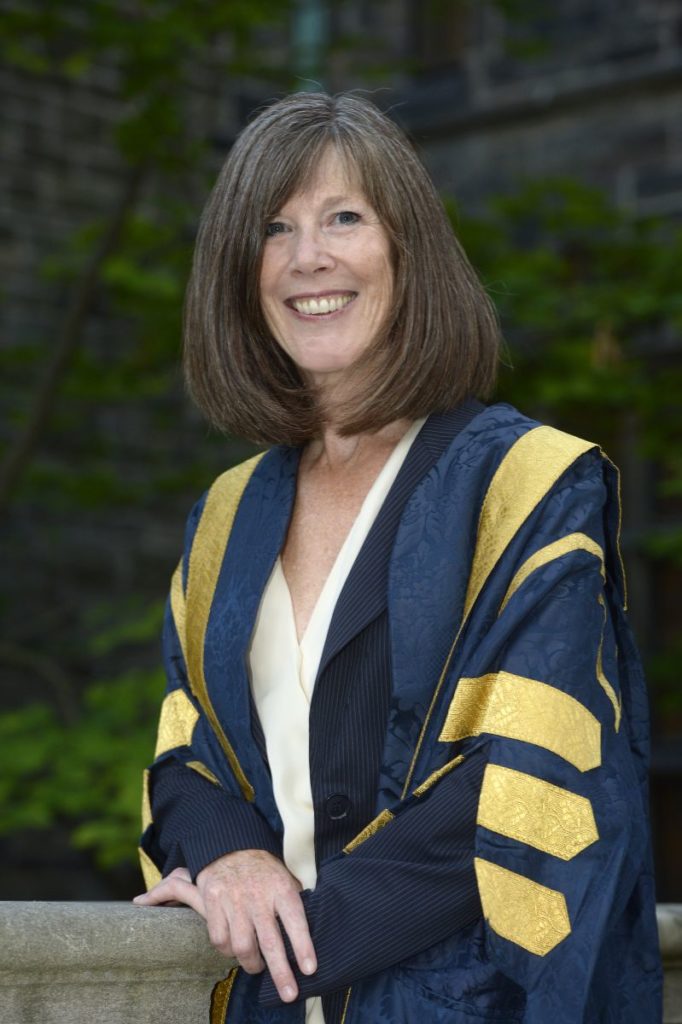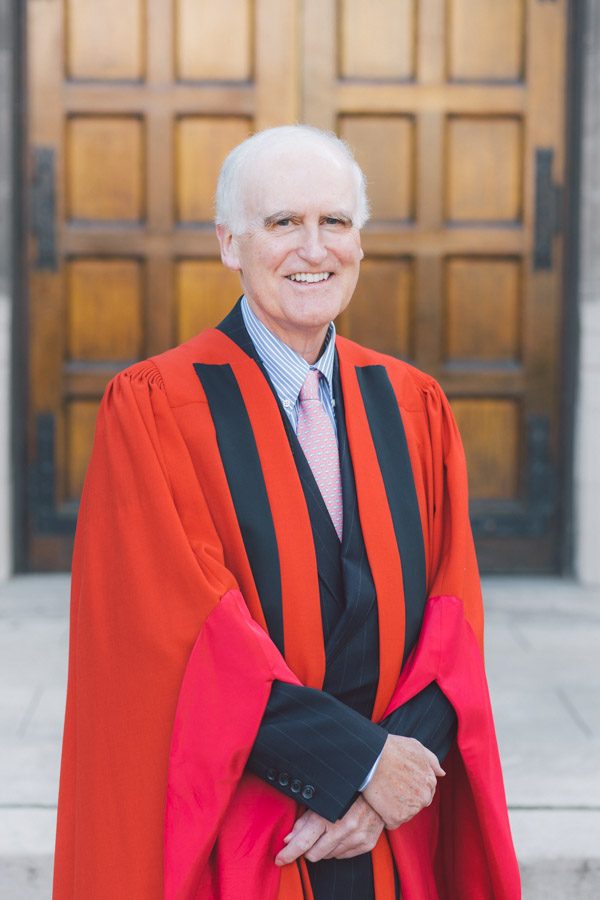Mayo Moran installed as 15th Provost
On September 3, 2014 at the annual Trinity College Matriculation Convocation, Professor Mayo Moran was installed as the 15th Provost of Trinity College (view her remarks below). In addition, Trinity graduate A. Charles Baillie was granted a Doctor of Sacred Letters (honoris causa).


Prof. Mayo Moran is Trinity’s 15th Provost

A. Charles Baillie, Doctor of Sacred Letters (honoris causa)
Installation Address to Convocation
Provost Mayo Moran
September 3, 2014
Chancellor Graham, President Gertler, Chairman Howard, Bishop Johnson, Professor MacDonald, Honorary Graduand Baillie and members of the platform party; distinguished representatives of sister institutions; members of Trinity College and the University of Toronto communities; students, alumni, family and dear friends, thank you all so very much.
I am deeply honoured to be chosen to serve as the 15thProvost of the University of Trinity College.
Tonight I would like to speak especially to the students who along with me are formally joining Trinity College in this ceremony tonight. Dear students you and I are beginning a lifelong journey and there are many things we share. Alike we are dazzled by the beauty of the buildings, the brilliance and energy of the students, the commitment of the staff and faculty, and the accomplishment of the alumni of this great college. But probably you, like me, have been a little bit puzzled by some things about Trinity. Here it seems, that nothing has the same name that it has elsewhere. That is part of its quirky charm of course but it also makes it more than a little confusing for us newcomers.
For example, what exactly is this ceremony today? Well, I am being installed as Provost as the new students are being matriculated. Installation I can deal with by quoting President Paul Gooch quoting Northrop Frye who said that installation is best reserved for massive pieces of equipment, like refrigerators and Presidents.
Trinity College of course has its own long history of illustrious installations.. Indeed, 1853, when the first Chancellor of Trinity College was installed, it was none other than the Chief Justice of Upper Canada, the Honourable John Beverly Robinson. At that ceremony, the lengthy address was delivered in Latin. I will not do that. For the Trinity College audience of 1853 however it was clearly rousing and records of the event say that the address was interrupted by frequent bursts of applause from the audience. Even though probably few in the audience today would burst into applause during a Latin address, the history of that long ago installation of Trinity’s first Chancellor tells us much about the traditions of deep learning and of leadership that have characterized this fine place from the very start.
So much for installation. But what about Matriculation?
I will freely admit to you that I wasn’t entirely sure what “matriculation” meant. I vaguely associated it with the finish, rather than the commencement of a level of education. So I did what every good researcher does—I googled it.
In its broadest sense matriculation means to be added to the list and indeed in many places now it refers to the completion of university entrance exams so my own first conception of it wasn’t entirely off. However, in the British universities like Oxford and Cambridge whose traditions inspire our very own Trinity College, the term is used for the ceremony at which new students formally become members of the university.
It used to be that matriculation required an entrance exam. So students if you were joining Trinity College in the 1850s you would not begin by attending a celebration, you would be writing an exam. You might have been comforted by the fact that historical records describe the exam as consisting of comparatively simple questions on Latin, Ancient Greek, and mathematics. On the other hand, it is true that the provost of 1859 decided to write to all of the school masters to reassure them that “in order to prevent mistake or disappointment”; Trinity would give more options in the Classical subjects and would not immediately require a paper in Classical History. Even then, as you can see, Trinity was distinguished by its exacting entrance requirements.
Once exams and traditions were abolished, matriculation tended to refer to frosh week events or to the administrative registration. But fact that here at Trinity we celebrate the ancient tradition of matriculation to mark the formal commencement of higher learning speaks to the continued centrality of the very best academic values in this special community, even though the emphasis may have shifted a bit from the early focus on ancient learning. Today’s ceremony reminds you that you are in one of the world’s centres of great learning. Students, welcome to the great privilege and as Spiderman said, the great responsibility, of higher education at Trinity College at the University of Toronto.
Through the ages, the graduates of Trinity College have gone on not just to excel but to make outstanding contributions in their chosen field. I know that this audience is full of so many examples but for the sake of brevity I will point as an illustration to our wonderful Chancellor Bill Graham who went on to be gold medalist at UTLaw after graduating from Trin. He had an outstanding career as an international lawyer, working on many famous cases, and then came back to Utlaw to teach law students there. He then went on to a distinguished career in politics including serving as Minister of Foreign Affairs, Defence and Interim leader of the Liberal Party. TC alum also know the importance of giving back and through his generosity, Trinity College is home to the Bill Graham Centre for Contemporary History that recently hosted an outstanding interdisciplinary conference on the 100th Anniversary of WW1—a symbol of everything Trinity stands for.
Similarly, tonight Trinity College is honouring Charles Baillie, who went on to Harvard Business School after graduating from Trinity College. He became an outstanding leader in business and in public life, serving as CEO of TD Bank and two time Chancellor of Queen’s U and is an Officer of the Order of Canada.
Although all of this may now seem very far away, you students too sitting here tonight will go on to make your own distinctive contributions, using your talent and the education and values that you will learn here to make the world a better place.
This commitment to making the world a better place is a key part of the Trinity college experience. Like matriculation, the “collegiate way of life” has ancient roots in the belief that a great education is at least in part a collective effort and is best developed through community. As a historian of Harvard College put it in 1936:
Book learning alone might be got by lectures and reading; but it was only by studying and disputing, eating and drinking, playing and praying as members of the same collegiate community, in close and constant association with each other and with their tutors, that the priceless gift of character could be imparted to young men.
While we would certainly extend it beyond young men today, there is a powerful sense that a community of learning enhances the efforts of each, making the whole inestimably more than the sum of its parts. At its best, on this view, education is not simply about the acquisition of knowledge, it is also about the development of character through community—discussion, play, shared communal activities like dining together and building a sense of collective and not just individual well-being. The importance of shared ethical values developed through community has always been a hallmark of the Trinity College you join today. Indeed, the quote on the bust of founder Bishop Strachan in the Quad reads as follows:
Our first and great object will ever be to produce young men of moral worth and sound learning—men who will in after life do honour to their professions and bless the society in which they move.
With one important correction which I’m sure you will have all noticed, Bishop Strachan’s objective is as resonant in the 21rst century as it was in the mid-19th century. Trinity College is animated by these traditions of learning together and of using the power that a great education confers to inspire you in your many different ways to make the world a better place.
So Trinity is distinctive not only for the academic excellence that has always been at its core but also for its belief that the best education develops the whole person, that the enhancement of character and of commitment are as important an aspect of university education as is the acquisition of knowledge, and that something very special happens when this is pursued collectively in an intimate collegial setting.
Students, that is the Trinity College that you and I are lucky enough to join today. We are fortunate indeed but like our predecessors we have a great task ahead of us. The most vibrant traditions are constantly remade. They are at once ancient and modern—handed down through time and yet constantly interpreted anew by each generation of students who, like you, will find your own meaning in them. Just as the students and provosts of Trinity past left their mark on this wonderful place, so too will we—incoming students and incoming provost work together and make our own distinctive contributions to this very special community. I look forward to the great task before us. Welcome to Trinity College.
Categories: Awards & Honours; College News; Provost’s Messages


